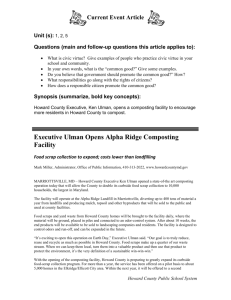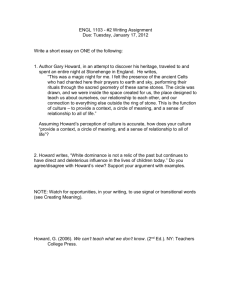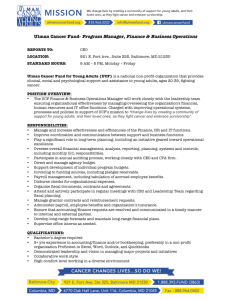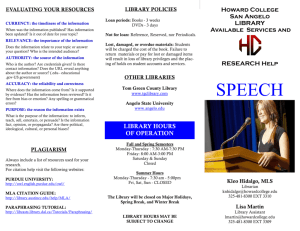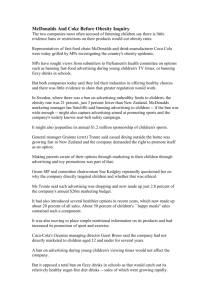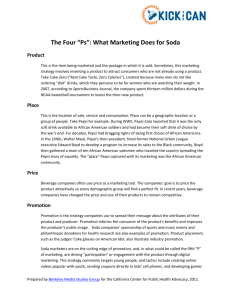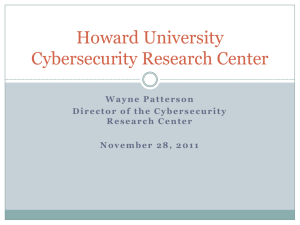Freedom PBT
advertisement
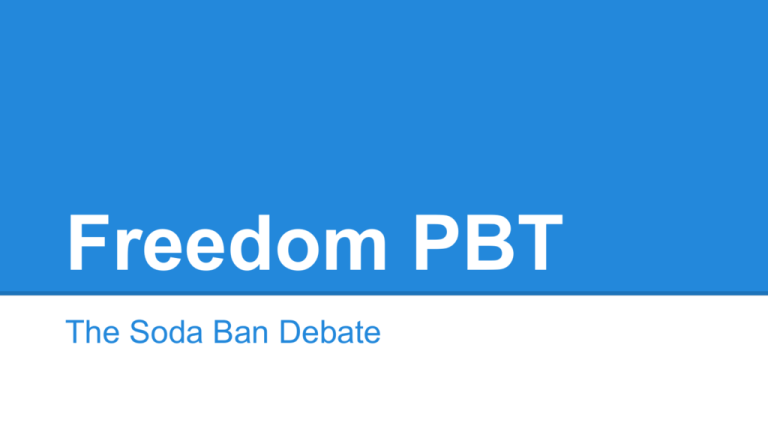
Freedom PBT The Soda Ban Debate Introduction This summer, the Howard County 4th of July fireworks event regulated the sales of foods and drinks sold. Howard County Executive Ken Ulman used an executive order, signed into law two years ago, which effectively bans non-diet sodas at county-sponsored events and limits the percentage of high-calorie packaged snacks that vendors can offer. According to the regulations, 50 percent of packaged food offered at county events must contain 200 calories or less per portion. Non-diet cold drinks must contain 40 calories or less, and diet drinks may only contain five calories and constitute only 33 percent of a vendor's beverage offerings. According to the Baltimore Sun, Ulman's nine-point justification for the order argues that health care costs for the soaring rates of obese and overweight Americans — in 2012, 56 percent of Howard County adults reported being above a healthy weight — are a strain on the economy. The order cites an Institute of Medicine statistic attributing 20 percent of the nation's weight problems to consumption of sugary drinks. This regulation has gotten national exposure with many advocates applauding Howard County’s attempt to elevate the area’s healthy living. However, not everyone has seen this healthier direction for the county as positive. Essay Prompt: Explanatory Directions: Carefully read/study the anchor source and the following additional sources related to recent regulations on unhealthy foods. Take notes as you read. Then synthesize information from the anchor source and at least two of the additional sources into a coherent, well-developed essay in which you address the following idea: How are food restrictions beneficial and detrimental? Make sure your essay focuses on answering the question; use evidence from the sources to support your reasoning. Avoid merely summarizing the sources. Indicate clearly from which sources you are drawing, whether from direct quotation, paraphrase, or summary. If you do not identify your source in the paragraph, make sure you include a parenthetical citation identifying where you got your information. Part One: Anchor Source Directions: Now that you know more about the background to this debate… 1. Read the Baltimore Sun article by Amanda Yaeger. 2. Then, reread more carefully, taking notes using the Cornell Note Taking method or another note-taking method that works for you. Be sure to copy specific quotes that you believe support both sides of the debate in order to use them in your final paper. Howard vendors question rules on festival fare New regulations ban sugary drinks, restrict sales of some foods By Amanda Yeager July 2, 2014 Baltimore Sun Some local vendors worry the restrictions will harm their sales this holiday weekend. In their view, the order runs counter to the ideals of liberty and personal choice celebrated on the Fourth of July. decreased in the past five years. But on Independence Day, she wants her customers to have options: "There could be some people who say, 'I don't keep soda in the house — let me get a Coke.' " "I was furious when I first read this order because the bottom line is people have a choice of what they feed themselves," said Beth Barnes, who has operated a kettle corn stand at Lakefront Fourth of July celebrations for nearly a decade. "[The regulations are] a violation of a person's freedom, their right to choose." When they ask where they can get a non-diet soda, she added, "What am I going to say? Baltimore County?" "We work when everybody else plays, so we have to provide products that people want to have while they're playing," said Douglas Henley, who owns Convenience Catering and Concessions and will be flipping hot dogs and hamburgers at his Lakefront booth on the fourth. The executive order doesn't place any restrictions on prepared foods like funnel cake, ice cream and Henley's burgers. However, he and Barnes said, some customers are just looking for a cold drink. "If it's hot, the soda and stuff goes like wildfire," Henley said. Barnes' water sales have actually increased and soda sales have Health and policy officials who are supportive of Howard's food and beverage standards said the discussion shouldn't be limited to a dichotomy between full-sugar and diet soda options. "There are hundreds of healthy beverage options out there," according to Ian Kennedy, director of communications for the Horizon Foundation, a Howard-based public health nonprofit that launched Howard County Unsweetened, an initiative to promote healthier drink options in the county, around the same time the executive order was passed. The group has created a website, BetterBeverageFinder.org, to help residents find healthier drink options, including unsweetened teas, 100 percent fruit juices and flavored waters. Sweetened beverages, Kennedy added, are "an easy thing to eliminate from your diet." (continued on next slide) Elizabeth Edsall Kromm, the county's policy director, called sugary drinks the "low-hanging fruit" in a larger effort to make Howard County a healthier place to live. "Howard County has a long history of initiatives and policies that promote a culture of health, and this was seen as a piece of policy to build a model public health community, and a critical one at that," Kromm said. "We're chipping away at this," she added. "[Obesity and its accompanying health risks are] a big problem to address, but slowly I think we're turning the corner where we're creating a culture of health where it's really easy to make healthy choices." Though Ulman's executive order was passed more than a year and a half ago, Kromm and county communications director David Nitkin said the implementation of its directives has been a gradual process. Regarding enforcement, Nitkin said the county won't “proactively enforce” the standards. “It's similar to the ban on smoking in parks,” he said. “We've had tremendous voluntary compliance, because it's what people want.” County Council member Greg Fox, a Republican from western Howard, has filed legislation that seeks to negate Ulman's executive order. The bill would remove any "limits on the kinds of foods or beverages sold on county-owned property or during county-sponsored events." Fox said he didn't think making lifestyle choices for citizens was the county's role. "Adults can make adult decisions and the market can take care of healthier things," he said, pointing to an expanding variety of healthy and low-calorie snack options in today's stores. A representative from the Maryland, Delaware, D.C. Beverage Association, Ellen Valentino, agreed with Fox's assessment. "The Fourth of July is a day in which Marylanders celebrate their freedoms," she said. "The irony is not lost when a family can't purchase a soda or lemonade at a celebration. The good news is that the soft drink industry has many options to choose from." Nitkin said the rules didn't restrict any freedoms: "People have freedom to bring the soft drink of their choice" to the event, he said. "Bottom line," he added, "we think this has been a reasonable, thoughtful roll-out of a policy that's designed to boost access to healthy choices. We know it's going to be a process and we know that people who are involved in food and beverage sales are going to have to make changes to meet the standards, but we think over time, this is the direction that we want Howard County to head and we think it's the direction the world is heading." Part Two: Additional Sources Directions: 1. Read and take notes on the additional texts. 1. Note: In addition to the anchor source, you must include references to both support texts in your essay. Support Text #1: Editorial Howard's sugary drinks ban needs boundaries Baltimore Sun, July 3, 2014 The idea behind County Executive Ken Ulman's ban on sugary drinks was a bold and noble one. It drew praise from not only the medical community but educators and parents, too. Ending the sale of sodas and other fattening food in county buildings showed that Ulman was making healthy eating a priority. But this week's Independence Day celebration at Columbia's lakefront has us wondering how far this ban should be allowed to go. Vendors have complained that the county's rules force at least 50 percent of their sales to be low-calorie alternatives, forcing them to either limit portion sizes or completely eliminate the sale of regular sodas and other drinks of a certain calorie intake. Aside from your Coke or Pepsi, that also means no sports drinks such as Gatorade or things like lemonade or sweetened iced tea. And while the idea of offering healthy alternatives is a good one, is a once-a-year community event really the place to be so strident? We'd be the first to acknowledge that Ulman's goals are based on solid figures considering the number of people who are obese and overweight in our society. In 2012, as our cover story points out, 56 percent of Howard County residents were above a healthy weight. That's not only a health issue but an economic one as well, as the impact reflects in our rising health care costs. And while we're with the county executive in wanting to encourage healthier options for people, we also have faith that people need to be responsible for their own life decisions. Ulman's critics have often charged him with creating a "nanny state" for restrictions such as this one. We've never gone that far in criticizing him because it's clear to us that his intentions have always been, as far as we can see, well intentioned. We are supportive of the cause. Still, some common sense needs to be applied. After all, moderation is a key to a healthy lifestyle as well. Instead, we'd wish there would be a more positive way to get the message across. Instead of making sodas and fatty food the forbidden fruit, why not do an education plan at the fireworks and other community events? It could be just as effective and more lasting. Vendors also make a good point in that the ban will only encourage people to bring their own drinks and food, hurting vendors and creating a less inviting atmosphere. Banning the sale of fatty foods and sugary drinks on county property should be within the county's purview. Extending that ban to community events, even as well intentioned as the goal might be, seems like an overreach, and in conflict with the independence we celebrate on the Fourth of July. Support Text #2: Editorial Fireworks in Howard County Our view: County's restrictions on unhealthy drinks and snacks at county-sponsored events or venues are no ban but a measured response to obesity epidemic Baltimore Sun, July 7, 2014 In Howard County, it's perfectly legal to consume the biggest, most gargantuan family-size bag of barbecue-flavored potato chips at one sitting and wash it down with a case of the most sugary soda ever made. Or, if that's not your taste, perhaps something more along the lines of the Homer Simpson diet with a thousand glazed doughnuts and a 64-ounce carton of chocolate syrup. County employees can partake of this artery-clogging, stomach-distending meal as often as they'd like. So can public school students. And they can do so in a county building or park or at a county-sponsored festival. But the one restriction the county has made is this: Howard County won't be your supplier. Under an executive order signed by County Executive Ken Ulman in 2012, healthier choices must be offered at county-sponsored venues and events. In the case of drinks, that means most sugarsweetened soft drinks can't be sold and that at least half of packaged food offered by vendors must have 200 calories or less per serving. No food or drink is banned. None. Zero. You can eat the worst stuff on the planet, but you better bring it yourself. If it's prepared food like funnel cake or cheeseburgers, there are no restrictions on sales whatsoever. Yet one would think from the uproar over the Fourth of July celebration at Columbia's lakefront last weekend that Mr. Ulman was single-handedly killing freedom and the "right to choose." And this week, County Council member Greg Fox, a Republican, has introduced legislation to roll back the executive order and prevent Mr. Ulman from taking similar action in the future. That Mr. Ulman is the Democratic Party's nominee to be the next lieutenant governor — sharing the ticket with Anthony Brown, the current lieutenant governor — probably has a lot to do with some of the trumped up outrage and the predictable "nanny state" protests that might have an impact on the gubernatorial race. Yet whether it will strike much of a chord with Howard County residents is another matter. (continued on next slide) Continued Easily lost in the politics is that Mr. Ulman's executive order regarding healthy food and beverages — along with an even more restrictive one adopted by the county school board that goes into effect this fall — is a reaction to an epidemic of obesity. More than one-third of U.S. adults are obese, and it's costing society more than $147 billion annually in medical costs, according to the U.S. Centers for Disease Control and Prevention. Diabetes, heart disease, high blood pressure and certain types of cancer can be traced to unhealthy eating, particularly sugary drinks. That government might elect not to enable such bad choices — much as it doesn't sell or promote tobacco use on county property either — is hardly out of line. Private companies are taking similar actions with their own vending machines and company cafeteria menus. We will admit this much: It's an inconvenient restriction on some vendors who prefer to keep hawking the unhealthy fare even if it's killing their clientele. And whether it should be applied fully to events that are not on county property, like the July 4th celebration, is a matter of debate. Already, Mr. Ulman has indicated that different criteria will be applied to such events in the future. That's probably reasonable — much like the occasional caloric "splurge" is acceptable, too — but not only should Mr. Ulman's executive order be allowed to stand but more jurisdictions should be following suit. According to Centers for Disease Control statistics, Howard County’s obesity rate of 24.8 percent is second lowest in the state. Eleven counties have rates above 30 percent, including two of the state’s largest jurisdictions: Baltimore City and Prince George’s County. Might there be moments when government goes too far to impose healthy choices on its citizenry? In theory, yes, but the reality is quite different. Whether there are fireworks involved or not, we remain a nation of cupcakes, fried pork rinds and Mountain Dew, and it's a lot easier to buy an unhealthy snack than to find a bag of carrots or apple slices in the local snack bar. Promoting healthy choices hardly seems like an over-reach. The day a county actually bans a food or drink simply because it's high in calories is a different story. Should that ever happen, we might even join those who would march in Ellicott City. Under existing law, Howard County residents retain the right to make bad choices; the county seeks only to enable them to make better ones. Support Text #3: Political Cartoons Cartoon A Cartoon B Cartoon C Cartoon D Support Text #4: Infographics Infographics from Huffington Post Infographics from Dr. Oz’s blog From http://blog.doctoroz.com/in-the-news/a-blow-to-obesity-new-york-passes-soda-ban PBT Checklist: When constructing your essay, be sure to ● include text evidence from the anchor source. ● include text evidence from TWO supplementary sources. ● properly cite each reference used within your essay. ● organize your essay in a logical structure that is easy to follow.
